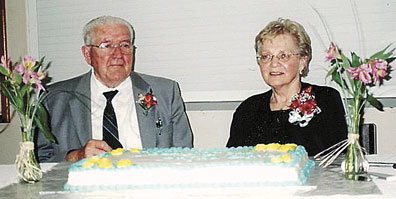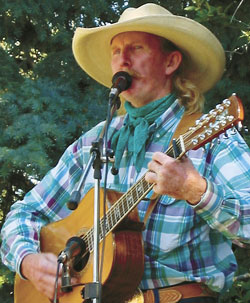Canadian Mennonite
Volume 10, No. 15
July 31, 2006

More than 40 years of lay ministry honoured
Winnipeg
 |
A festive atmosphere greeted members of Sargent Avenue Mennonite Church as they gathered on June 9 to celebrate the services of Gerhard Ens and Ingrid Cornies on the occasion of their retirement from lay ministry in the church.
When Gerhard and Anni Ens began attending Sargent Avenue, the members recognized his ordination to the ministry in 1957 in the Blumenort congregation and invited him to share his preaching and teaching gifts with them in 1977.
Cornies grew up in the Sargent Avenue congregation, pursued her education—which eventually led to work as a chaplain to university students—and was called to lay ministry in 1992 and commissioned in 1993.
From the early 1950s to the present, the congregation has been enriched by the ministry of nine people who had been called to the ministry in other churches. Under the leadership of the leading pastor, lay ministers took their turns preaching, as well as teaching and giving counsel and pastoral care in the event of illness and death.
Margaret Pankratz, a long-time friend of Cornies, paid tribute to her, highlighting the qualities listed in Galatians 5:22—qualities which have been evident in Cornies’ ministry.
Martin Friesen, a colleague in lay ministry, expressed appreciation for the 29 years Ens has enriched the life of the congregation as a preacher who made his sermons relevant, a teacher who developed a special bond with his Bible study students, and an historian who made the church’s past come alive.
In an audio tribute, Menno Wiebe shared a part of Cornies’ sermon in which she spoke of einigung (the church coming together through prayer), while Ens spoke of his experiences as a conscientious objector.
Pastor Edwin Epp led the congregation in a meditation, expressing appreciation for the collegiality he experienced with Ens and Cornies. In reference to wisdom in James 3, he observed that both displayed “reverent, yet gentle wisdom,” which they “have lived and shared with us over the years.”
Cornies shared her feeling that all church members were her colleagues. She expressed the difficulty of counselling people she knew while staying as neutral as possible.
Ens gave thanks for the opportunity to lead Sargent Avenue’s Bible study for many years.
In turn, members of the congregation had some time to express appreciation to the guests of honour during an informal time of refreshments that brought the evening to a close.
Cowboy preacher explains how training is more than teaching
Didsbury, Alta.
 |
It was a beautiful warm sunny morning, the perfect day to set out for church on horseback or by horse-drawn carriage.
Each summer the Bergthal Mennonite Church congregation invites the neighbouring Mountain View Missionary Church to join it in celebration of the rural cowboy lifestyle in an outdoor worship service. This year some visitors returning from the MC Canada Assembly in Edmonton also joined in the service.
Everyone gathered in the shade of some trees on blankets and in lawn chairs near a hay wagon for a stage. Familiar old songs and hymns were sung, accompanied by guitar. Inspirational stories about the presence of God in nature were read.
This year’s guest speakers, Marvin and Karen Engle, ministered by sharing God’s word through story and song in authentic cowboy style.
Marvin is a working cowboy who uses his roping and riding skills in everyday life—not just for entertainment and leisure. His life as a cowboy and horse trainer has given him special appreciation for Proverbs 22:6: “Train children in the right way, and when old, they will not stray” (NRSV).
He explained that training is far more than teaching or preaching. It involves practising and reinforcing behaviours and actions until that is the natural response, he said, noting that it is through the daily example that parents set for their children that they are trained.
Horses—even more so than children—do not learn from words. “If your actions do not mirror your intentions, you have lost ground in training,” he said.
The service concluded with a potluck lunch.